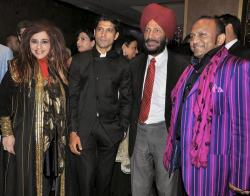 New Delhi, Jul 11: The inspiring story of Milkha Singh, the Indian athlete who missed an Olympic medal by a whisker, is now revealed by the sportsman in a soon-to-be released candid autobiography.
New Delhi, Jul 11: The inspiring story of Milkha Singh, the Indian athlete who missed an Olympic medal by a whisker, is now revealed by the sportsman in a soon-to-be released candid autobiography.
In "The Race of My Life: An Autobiography by Milkha Singh" by Rupa Publications, the star athlete shares the amazing highs of winning India's first ever gold in athletics at Commonwealth Games, the unbridled joy of being hailed as the 'Flying Sikh' in Pakistan, as well as the shattering low of failure at Olympics.
The book contains an introduction by son Jeev Milkha Singh and a foreword by filmmaker Rakeysh Omprakash Mehra whose biopic on the early life and career of running legend "Bhaag Milkha Bhaag" starring Farhan Akthar is scheduled to hit theatres on July 12.
The autobiography has been co-authored by Singh's daughter Sonia Sanwalka. "My journey into his life through the film, 'Bhaag Milkha Bhaag', made me understand how devastating this loss was for him. However, Milkha Singh's extraordinary resilience made him step out of the darkness of failure and find redemption. But his catharsis was not easy, for Milkha had to face his inner demons and deepest fears to come through as a winner, in life.," writes Mehra.
Milkha Singh was born in 1932 in undivided India.
"Milkha Singh saw it all a bloody Partition, a lost childhood, homelessness, petty crime, and victories hard won - and easily lost. And yet, even after witnessing so much horror and despondency, his will to live every precious moment of life to the fullest is what legends are made off. His life to me is satrangi, a rainbow of many vibrant colours," says Mehra.
The famous 400-metre champion, infamously lost the ultimate race of his life—the 1960 Rome Olympics. In the tome Singh details his heartwrenching loss.
"All through my life, I have been tormented by the fatal mistake I made in Rome on the day of the 400-metre race. I knew that I could have won, but perhaps, luck was not on my side that day. The one medal I had yearned for throughout my career had just slipped through my fingers because of one small error of judgement. Even today, if I look back on my life, there are only two incidents that still haunt me—the massacre of my family during Partition and my defeat at Rome," writes Singh.
Singh writes about his joy about being selected to represent India at the Olympics in Melbourne, Australia. Even though his performance at the event was disappointing he met several foreign sportspeople, including Charles Jenkins, America's top athlete who gave him valuable pointers in running.Between 1956 and 1957, Milkha Singh writes his primary mission in life was to excel in running. "The track, to me, was like an open book, in which I could read the meaning and purpose of life. I revered it like I would the sanctum sanctorum in a temple, where the deity resided and before whom I would humbly prostrate myself as a devotee. To keep myself steadfast to my goal, I renounced all pleasures and distractions, to keep myself fit and healthy, and dedicated my life to the ground where I could practise and run. Running had thus become my God, my religion and my beloved," he says.
A chapter recounts Milkha's Singh' meeting with Pandit Jawaharlal Nehru after the Games in Japan. At the reception thrown by the late Prime Minister Singh says Nehru asked him to sit next to him. "My boy," he said to me, "you have brought great pride to our country. If you keep up the hard work, you will be one of the world’s top athletes.’ To which Singh replied, "Panditji, my interest in running was awakened recently, and I have taken an oath to persevere until I attain the goal I have set for myself."
Son Jeev Millkha Singh, a professional golfer writes in the introduction, "I think the greatest gift he has given me, apart from his genes, is not knowing the meaning of the word 'impossible', and his never-say-die attitude, is the wonderful support and guidance in helping me chart my own life and career."
The book concludes with Singh's hope that his autobiography would inspire youth to take up sports. "I am neither a writer nor an author, but a sportsman with passion, who has poured his heart out in this book. Although I am not a man of words, I hope this book can inspire the youth to take up sports and strive to excel," he writes.





Comments
Add new comment